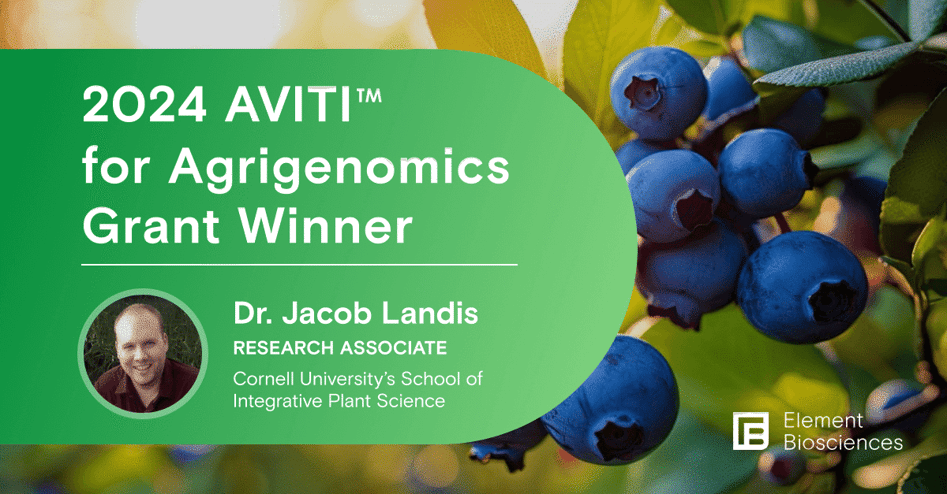AVITI™ for Agrigenomics Grant Winner to Study Plant Adaptation to Climate Change, Environmental Stresses
Sign up for our newsletter
Join our scientific community to stay up to date with Element news, insights, and product updates.
This site is protected by reCAPTCHA and the Google Privacy Policy and Terms of Service apply.

How do plants adapt to stresses such as climate change and habitat alterations? What genes help plants make these crucial adjustments? Today, these questions have become more important than ever as the combined challenges of population growth and climate change make it urgent to secure the global food supply.
The AVITI for Agrigenomics Grant, first announced in January, presents an opportunity to push genotyping farther and faster with free sequencing services from Element Biosciences and Daicel Arbor Biosciences. For the 2024 AVITI for Agrigenomics Grant, we chose Dr. Jacob Landis, research associate at Cornell University’s School of Integrative Plant Science.
Genetic adaptations to environmental change
Landis’ winning proposal examines the genomes of the Andean blueberry—a wild plant native to the Andes Mountains in Ecuador—to see how they change in reaction to changes in altitude and climate. The blueberry (also called mortiño) lives between 5,000 and 14,800 feet above sea level and is an important part of the Andean diet and culture. It contains a wealth of anthocyanins, antioxidants and flavonoids and is used widely in traditional drinks, ice creams, wines and preserves. It also has been used in some medicines. The plant is well known for its ability to recover from deforestation and fires in high altitude ecosystems.
Landis, in collaboration with researchers at University of San Francisco in Quito, Ecuador, will use the AVITI for Agrigenomics Grant award to sequence four populations of blueberry, two at low elevation and two at high elevation. In each population, the researchers will sample 10 individual plants. The grant, offered jointly by Element Biosciences and Daicel-Arbor Biosciences, awards Landis and his colleagues two flow cells of sequencing and up to 48 library preps. Once sequenced, the researchers will correlate any differences with plant phenotype and environmental data. “The Andean blueberry can adapt to rapidly changing environments,” Landis said. “What areas of the genome are under selection? Why are the samples at higher altitudes successful up there?”
From mountain sample gathering to sequencing
Currently, the Ecuadoran researchers are gathering samples in the Andes. Previous research has shown that berry plants growing successfully at higher than 13,000 feet form a unique genetic cluster, regardless of whether they originated from lower or higher latitudes. They also noticed that at higher altitudes, genomic heterozygosity decreased.
For Landis, who had not studied the Andean blueberry before, the grant opens the door to unusual experimentation. “The plant lives at different elevations, and we want to see how the genome is responding to climactic changes. It’s a nice experimental setup without setting up the experiment, because the setup is already there!” he said.
Once the Ecuadoran team has completed sampling, they will send the DNA to Daicel Arbor Biosciences for sequencing on their AVITI system. They hope to have DNA ready in a month or so and are aiming at presenting their findings next January at the Plant and Animal Genome XXVI Conference (PAG). The Element/Daicel grant is also making sequencing in developing countries more accessible, Landis said. “Sequencing is a lot more expensive there,” Landis said. “We looked to AVITI as a less prohibitive way to sequence these samples.”
We are delighted to support Jacob’s work in genomics research and in helping introduce advanced sequencing techniques to countries like Ecuador. This work has the potential to help agricultural researchers and crop breeders better understand how plants and animals react to climate changes.